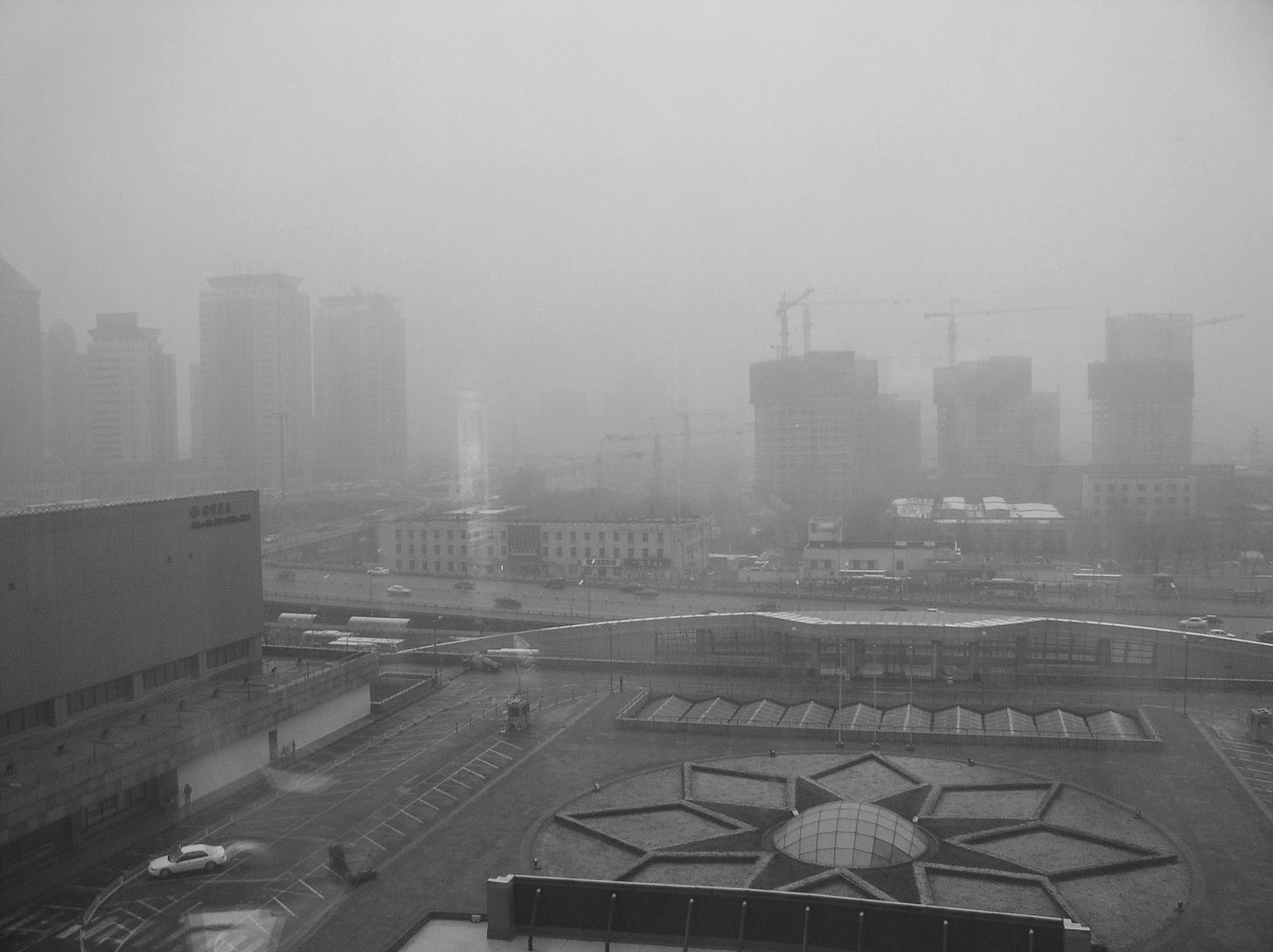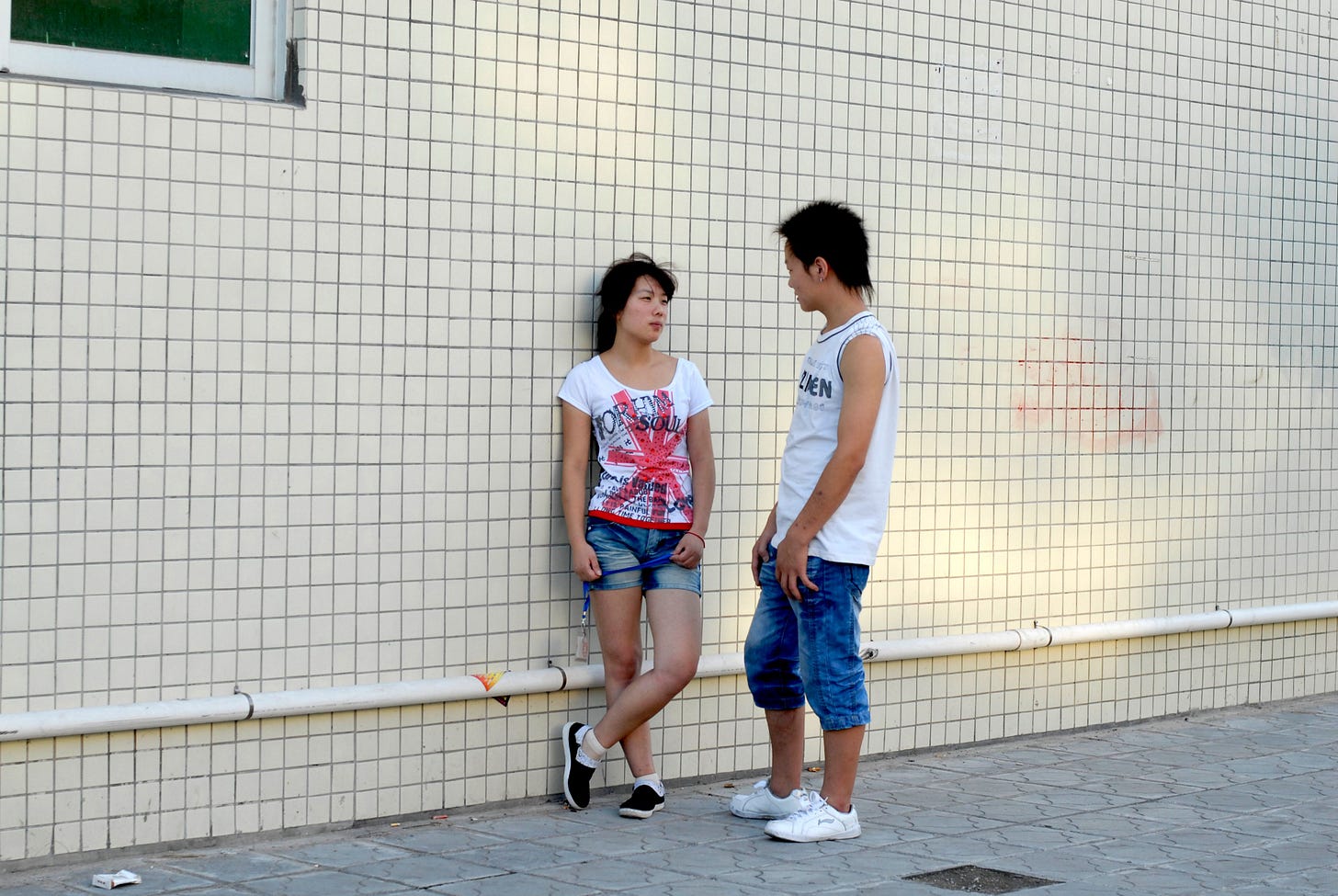An Ethnography of the Heart: Unveiling a Love Crisis Among Chinese Migrant Workers
More From Our Podcast about Love Stories, and an Icebreaker Poll
Hello, Gregory here. I made a big announcement last night about this newsletter that you can read all about here. And if you’ve come because you heard me say something on the podcast about free Rough Translation stickers, click here and if you’re one of the first 50 to subscribe I’ll be in touch.
Today’s episode on NPR features the work of a cultural anthropologist whose research I have admired for years. Wanning Sun has a habit of looking at world events from angles that make you rethink your own experience of that thing. For example, smog.
Remember the smog in Beijing? For years the Western media was full of stories about Chinese air pollution, and China was also getting a drubbing online from its own citizens. Some predicted then that the Chinese government would not survive this public relations crisis. As Wanning argues in a co-authored paper: the opposite happened. The government became even more adept in manipulating public opinion thanks to those smog crises. (When the evidence is literally floating in the air around you & killing people, it takes some highly Orwellian messaging to keep social control.) Every time another smoke blanket descends on my home in New York from Canadian wildfires, I think about who might be watching and taking notes.
But Wanning’s latest book is about a different kind of nebulous national crisis: love.
For the last few years, Wanning has been talking to Chinese migrant workers about their love lives. These are workers who toil long shifts in Chinese factories, producing iPhones and everything else. As might be a surprise to no one: grueling shifts, low pay, and mass migration can do a number on people’s dating success.
But if you look closer at the conversation around the heartaches of migrant workers, (As Wanning’s new book, Love Troubles does), what you see isn’t just a story of relationships derailed by unregulated capitalism.
What you see, in a country where you’re not supposed to talk about class, is a proxy conversation about China’s have and have nots.
Income Inequality in China is high
China, by many measures, scores high in income inequality. China is more unequal than the United States. The picture is complicated though, and in trying to make sense of various graphs and data, I ended up emailing Jeremy Ney, who publishes American Inequality (a thoughtful, creative, data-rich Substack I recommend. He explained to me that while China’s income inequality has actually fallen in the last decade as the middle class has grown, migrant workers’ wage growth has slowed compared to their office worker counterparts:
Combined with the fact that marriage rates are plummeting across the country.
Which brings us to the national anxiety around the love lives of factory workers. Official state reports warn of a potentially criminal underclass of sexually frustrated men. Among China’s elite, there is some guilt that these workers are paying a kind of loneliness tax for being the engine of the nation’s growth. The question of whether young factory workers get hitched and settle down has become not just a question of their own future but a referendum on China’s rise. Given these national stakes, there is a lot of research and debate and propaganda about the love lives of these workers. But there are very few people like Wanning actually sitting down with workers to talk about love.
When she did talk to factory workers about their love lives, she heard a lot of pessimism and hopelessness. People told her they had disappointed their parents, and themselves. These conversations also profoundly shifted Wanning’s anthropological approach.
An Ethnography of the Heart
“I have found it is not only useful to hear what workers tell me about whom they want to date or do not want to date, or why they can or cannot find a lover,” but also how they tell different kinds of love stories, Wanning writes. And “in order to learn how inequality impacts on intimacy we must conduct a different type of fieldwork, one that enables us to discover the invisible, to listen to awkward silences, and to understand absence and erasure in the narratives of marginalized individuals.” She calls this an “ethnography of the heart.”
I love this idea, and over the next few months I’m going to come back to it in a few ways. How do we listen to awkward silences, discover the invisible, and hear what people are not saying? There are tools for that. I’ll be talking to more people to discover them.
A getting-to-know-you poll question:
And speaking of polls…
Your responses to my last poll were fascinating and I’ll be sharing what I’ve learned there very soon in a future post. Also, we have a winner of the postcard contest. TBAS! Finally, immense thanks to Zhan Youbing for giving me permission to use his photos of workers in Dongguan, and to Jeremy Ney (of American Inequality) for his patience with my many questions.
Comments welcome.












Absolutely fascinating, thank you. Look forward to reading more. Zhan Youbing's brooding pictures honestly blew me away, they're exquisite. A perfect 'marriage' of text and image. Blessings.
Thanks again for featuring our insights here on inequality in China!